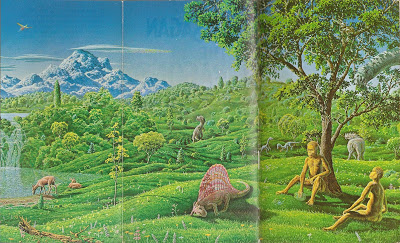Until now, my coverage of Carl Sagan’s The Dragons of Eden has been on a chapter to chapter basis presented in the “Read Along” section of the blog. As mentioned in my last post, I will be scrapping this in favor of exclusive reviews on selective books I wish to discuss, henceforth. So, without further delay, let’s bring the curtains down on The Dragons of Eden.
The premise of the book is clearly stated in the subtitle: “Speculations on the Evolution of Human Intelligence.” Sagan wishes to explore the various facets of human intelligence by calling to motion a simple question: why are humans, humans? He attempts to investigate, in what has been a shared effort by the academic community, a conclusive answer to this question from a purely scientific viewpoint while entertaining “occasional excursions into myths, ancient and modern.” The title of the book supports Sagan’s approach in a compilation of ideas on the “unexpected aptness” of various different myths when compared to scientific theories.
Beginning with time immemorial at the Big Bang, we ride the waves of time flowing toward the current epoch of human civilization. Human evolution is often described in the form of a metaphor, an “abstraction of beasts,” as Sagan uses various comparative arguments to build the foundation of his work in the earlier chapters, particularly in Chapter 2 – Genes and Brains (which I provided a full summary of in the Read Along), before settling into the pivotal point of his work which focuses on the evolution of human intelligence in the subsequent chapters describing the characteristics of the human brain and its evolutionary growth.

Following the footsteps of his predecessor in Jacob Bronowski, whose work in The Ascent of Man is an account of how human beings and human brains evolved, Sagan has presented his own unique approach to the same subject in his book. While we don’t necessarily discover an absolute answer on the origin of human intelligence, Sagan’s book is nevertheless an exhilarating journey that offers his insight into the brains of man and beast, the plethora of recent discoveries in science supporting the theory of human evolution, and most interestingly how they serve to be the function of our most familiar myths, and legends.
Sagan’s work doesn’t end there. His arguments and words serve as microphone toward the need for intellectual rigor, and a rejection of the absent skepticism prevalent in modern-day society. Altogether, The Dragons of Eden is an excellent book that talks about all kinds of things, from the reasons for sleeping and dreaming to the definition of death in what is a fascinating and delightfully short compendium of knowledge that should be read by everyone alike. Sagan was an influential science communicator (one of my favorites), if not one of the best; his works are well worth the effort of reading for anyone interested with or without a scientific background.

